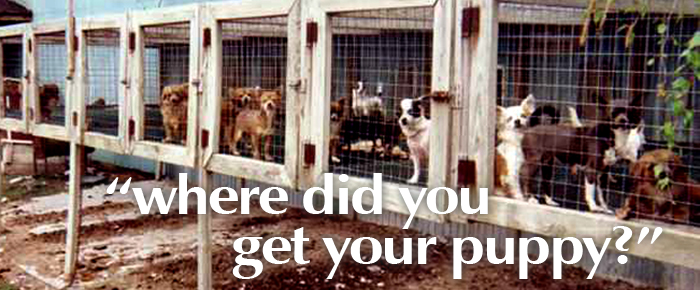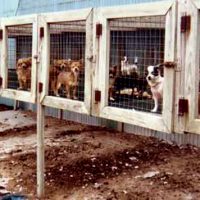
By Janet McAfee
Did you know that less than 20% of the people seeking a pet will go to an animal shelter to adopt one? It would be hard to believe this if you were at the San Bernardino County shelter at Devore this past week. Throngs of people lined up outside the shelter, beginning at 5:00 am, and five news crews brought in their trucks to cover the story at 10:00 am when the shelter opened. There was no room for the hundreds of prospective adopters and rescue groups to fit inside the tiny shelter lobby. The shelter staff worked frantically to control the crowd and implement a system that allowed 190 dogs rescued from a nearby puppy mill to find a home with humans who care about them. The scene was reminiscent of a bargain basement sale at Macy’s. I wish folks realized they can get fabulous dogs at shelters any day of the week.
I went to the shelter on the first day the puppy mill dogs came available for adoption and rescue. I was in the dual role as a journalist for the CV Weekly and as a rescuer for Loving All Animals in Palm Desert. I didn’t know whether to bring 10 crates in a van or 3 crates in a car. The story was on televised news throughout Southern California. The newscast showed horrific scenes of the ramshackle home in the middle of the high desert where the dogs were kept amidst debris and broken windows. The house was abandoned, and the dogs were out of food of water.
People came from Orange and San Diego counties to adopt these beautiful animals. It turned out that I was the “lucky” person who, in a lottery system, obtained a “rescue only” 2-yr-old Yorkshire Terrier. Tiny Bitsy is now in a wonderful foster home, and she is starting to relax and loves being in her foster dad’s arms. This may be the first time this pup was ever held. I suspect her foster parents will add Bitsy to their family.
Pictured here is Royce Bordes, with Angels N Paws, a nonprofit group that helps animals at the Devore shelter year around. Royce, on the left, rescued three little Chihuahuas, knowing that Chihuahuas are the second largest breed to be euthanized in California public shelters. Usually Royce is alone during trips to this shelter, and reports she’s never seen anything like the public outpouring to help this group of animals. Sandra Sneed, on the right, is with Gone To The Dogs, another private rescue group on the scene.
Hidden away from public view, often down dirt roads in rural areas, these large commercial breeding facilities operate without licensing. They warehouse animals in unfathomable conditions, without decent food, without human contact, without heat or air conditioning, and certainly without medical care which would eat into their profits. The animals are badly matted, often sick, and often frozen in distress. On February 6, 2015, a phone call alerted San Bernardino county animal control that a large numbers of pure breed dogs were abandoned in a Lucerne Valley home without food and water. At least 2 of the dogs had died, and the remaining animals would have suffered a horrible death in the middle of the desert had animal control officers not arrived when they did. There is an ongoing criminal investigation into this case.
The Lucerne dogs were a bit luckier than some large scale operations. These 190 dogs had a concrete or dirt floor, and were housed in areas where they could move around amongst their companions. Some animals are confined outside in small wire cages stacked up on top of each other. The females often lose their teeth due to over breeding. They are kept outdoors in the freezing cold and in the scorching heat.
Have you ever purchased a pet online? Do you know someone who has? Have you ever purchased a cat or dog from a pet store? If so, do you know where that animal came from or the conditions of the parent animals? The pet shop owner might tell you that their animals come from “reputable local breeders”. In fact, no responsible breeder who cares about their animals would ever deliver them to a pet store. Nor would they sell them online and ship them by cargo across the country to a complete stranger. A responsible breeder would welcome you into their home and facility, show you the parent dogs, and provide information about pet care. Many would argue there is no reason to buy from any breeder because 30% of the animals in shelters are pure breed animals.
My confession comes next. Twenty years ago, I purchased a Tonkinese cat from a breeder in the Oakland hills. I wanted to ensure that I was getting a cat with a friendly personality to match up with my senior cat, Isis, a rescue from the San Francisco SPCA. Back then, I was unaware of the crisis of unwanted dogs and cats in shelters. The cat I purchased had none of the traits typical of her breed, and Bianca even bit my landlord. If I had gone to a shelter, I could have adopted, saved a life, and saved a lot of money.
I plan to write more articles on the topic of puppy mills in this column. One article will focus on socializing dogs rescued from puppy mills, and share the amazing road to “recovery” of some. Another story will examine the legal and regulatory issues concerning these large scale breeding operations. Meanwhile, if most people knew better, they would do better and “adopt rather than shop”. Communities across the country are starting to ban the commercial retail sale of dogs and cats, the city of Oceanside being among the most recent. These communities battle with some commercial breeders who claim breeding dogs in any conditions they choose is their right, and the government should leave them alone. Those of us who love and appreciate these creatures God gave us hate to see them suffer, and would argue otherwise.
We need to stop blaming the shelter staff for problems fueled by financial greed by those selling animals for profit, and ignorance on the part of the public who purchase from them. I witnessed the staff at the Devore shelter doing all they could as a government agency to care for and find homes for this huge influx of dogs while the usual stream of strays and owner turn-ins continued. The county must follow laws that protect animals and the laws that protect our citizens from unreasonable search and seizure of property. Domestic cats and dogs are considered personal property, and due process must be conducted before these animals could be legally adopted. Whether or not you love animals, your tax dollars fund an expensive shelter system to deal with the crises caused by puppy mills and “back yard breeders” that often neglects and abuses animals.
Go to www.petfinder.com to find a particular breed or type of pet from a rescue. Contact Loving All Animals at (760) 834-7000 to obtain a list of local shelters and rescue groups where you can adopt that special animal. Call our office and get on our mailing list. We will make it fun for you to be part of our “rescue family” with Yappy Hours and events for you and your pet. ADOPT, DON’T SHOP.
Jmcafee7@verizon.net














































